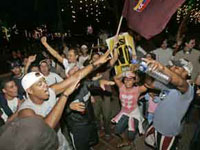Chavez could not be reelected in 2013
Chavez’s inititative to deepen his Socialist revoultion suffered a serious blow on Sunday, when 50,7 per cent of the Venezuelan voters said no to his request to change the country’s constitution. The results of the referendum have an initial effect: Chavez’s term in power has a certain expiration date: 2013.

Since Chavez won’t be able to become reelected, according to the terms of the current constitution, the question now is wether the President will be able to keep the power he gained during the first nine years in office. “If I lose, you should look for my succesor”, Chavez warned during the campaign, but there is still a long way ahead to 2013 and no one is ready to put him out of the race.
The defeat also calls into question whether Chavez will be able to deepen his socialist revolution in the oil-rich country. He has been pushing for more government control over the economy, which is suffering from high inflation and shaky business confidence. According to some observers, high prices of crude could bring stability for Venezuela in the medium term, but limits to his policies are also coming from below. Many people, mostly poor and middle class is suffering inflation and some of their dislike was reflected in the polls Sunday.
Chavez’s intention to obtain constitutional sweeping powers were rejected for a big portion of his supporters, including Gen. Baduel, the army chief who returned him to power after a failed coup in 2002.
People poured into the streets Sunday night to celebrate the results after Chavez acknowledged the outcome. Voters broke Chavez's string of more than a dozen electoral victories since 1998, rejecting 50.7% to 49.3% dozens of amendments to the 1999 constitution. About 56% of the country's voters participated. Most polls had given opponents of the referendum a slight lead in the days running up to the vote in spite of lavish government spending to pass the proposal.
While accepting the outcome of the voting, Chavez isn't giving up his effort to change the country's government. "This isn't a defeat," he said at a press conference, just minutes after the results were released early on the morning of Dec. 3. "For me, it's another 'for now.'" The expression has an important historical reference in Venezuela. Chavez led a coup attempt in 1992 that failed. After that unsuccessful attempt, Chavez said his efforts had ended "for now" and vowed to continue his struggle—an effort that eventually put him in power.
The results mean that Chavez will serve through 2012, barring any additional changes. "We will continue constructing socialism but under this constitution," Chavez said at the press conference, holding a copy of the 1999 constitution. Chavez, who was granted powers earlier this year to pass bills by decree, has the right to exercise that power for another 10 months.
The opposition has also a big challenge ahead. Even when succeeded in blocking Chavez intentions to erase limits to presidential terms, it has systematically failed in providing Venezuelans with an accurate alternative program to the current rule. On the other hand, analysts believe that much of the rejections to the constitutional reform came from Chavez supporters who decided not to follow their leader this time, but are not ready to jump to the opposition as still trust the President.
Hernan Etchaleco
Subscribe to Pravda.Ru Telegram channel, Facebook, RSS!


